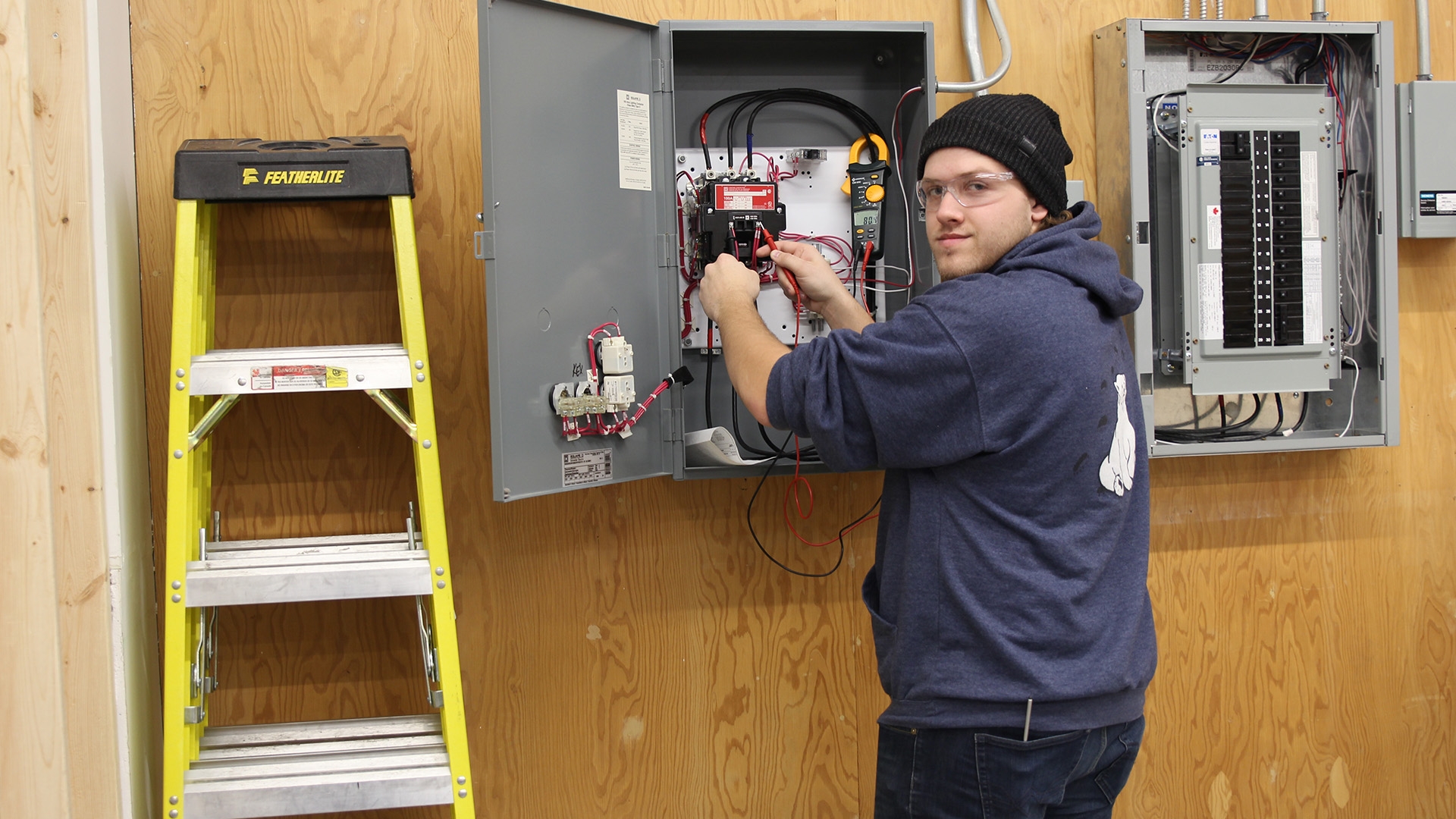Applied Electrical Installation
Overview
Assiniboine’s six-month Applied Electrical Installation certificate program prepares graduates for an entry-level position in the electrical trade.
Graduates who register as an apprentice within two years of finishing the program may get in-school training credit for Level 1 Construction Electrician apprenticeship, Level 1 Industrial Electrician apprenticeship or Level 1 Power Electrician apprenticeship.
KEEP ME IN THE LOOP!
Fill out the form below to receive more information about our program and related events.
Program Learning Outcomes
- Complete work in compliance with provincial and/or national codes, applicable laws, standards and ethical practices in industry.
- Comply with health and safety practices and procedures in accordance with current legislation and regulations.
- Install, service, and maintain wiring systems.
- Install, service, and maintain motors and control systems.
- Discuss signaling and communication systems.
- Communicate and collaborate with diverse clients, supervisors, coworkers and tradespersons to complete projects on time and to maintain effective working relationships.
Examples of what graduates from this program can do:
- Read and interpret various types of drawings and specifications.
- Use electrical test equipment and digital technology to ensure system safety, functionality and compatibility.
- Use analytical and problem-solving skills in order to read and interpret diagrams, drawings and specifications.
- Use mechanical aptitude to install, diagnose and repair systems and components
Success Factors
You might be a good fit for this program if you have or would enjoy:
- A short, introductory program in the electrical trade.
- Technical aptitude for understanding electrical systems and circuitry.
- The physical ability required to work in tight spaces, climb ladders, and lift heavy objects.
- Troubleshooting electrical problems.
- Are meticulous and pay close attention to detail.
- Are safety conscious and able to communicate effectively.
- Are adaptable to changing situations and work effectively in a variety of settings.
- Are self-motivated and able to stay on task without direct supervision.
- Are able to work safely and effectively in a variety of settings.
- Can work in a collaborative team environment or independently as the situation requires.
A valid driver’s license and access to a vehicle is strongly recommended given the potential need to travel for practicum placement.
The industry and program environment require individuals to:
- Move around and work within the environment, negotiating different areas including stairs and ladders, confined spaces, heights, uneven terrain and scaffolds.
- Complete responsibilities requiring standing, bending, and climbing.
- Have the strength, dexterity, balance and stamina required to work in or on equipment.
- Work in noisy, dusty and/or fume-filled areas with appropriate personal protective equipment.
- Interpret drawings, specifications, building codes, regulations, laws and standards.
- Communicate effectively with others including suppliers, co-workers, other trades people, safety and building inspectors, manufacturer representatives, and customers.
- Work in shifts and meet deadlines under conditions that are unique to the industry.
- Be reliable, punctual, and regularly attend.
- Listen to and follow directions accordingly.
- Demonstrate safety-conscious attitudes and work practices.
- Working outdoors in extreme weather conditions.
Interested in exploring similar program options?
We've got you covered! Here are some other great program options to consider.
Applied Building Construction
Applied Plumbing
Construction Electrician
Admissions
Admission Requirements
- A complete Manitoba Grade 12 or equivalent
- Consumer/Essential Mathematics 40S or equivalent
If you received your education outside of Manitoba, please review the equivalent admission requirements: Interprovincial or International.
English is the language of instruction at Assiniboine. All applicants educated outside of Canada or in a country not on the test exempt list are expected to meet the English language proficiency requirements.
READY TO TAKE THE NEXT STEP IN YOUR EDUCATION JOURNEY?
Start your online application today and join Assiniboine College!
DON'T MEET ADMISSION REQUIREMENTS?
If you don’t meet admission requirements, visit our Centre for Adult Learning to upgrade courses.
Careers & Connections
Careers
- Electrical contractors
- Construction
- Maintenance companies
- Public utilities
- Wholesale suppliers
Connections
Students who successfully complete the accredited program with an accumulative average of 70% or better in the trade subjects and level for which the program was accredited, gain employment and register as an apprentice within two years of graduating, will receive credit for Level 1 in-school technical training and 900 hours in the Construction, Industrial or Power Electrician apprenticeship program.
Assiniboine has a number of agreements with other colleges, universities and professional organizations, making it possible to apply credit taken at Assiniboine to programs at other institutions. For information on agreements, see Articulation Agreements.
Tools & Supplies
Our classrooms, labs and shops are equipped with the necessary equipment that you need to make the most of your experience. However, there are some tools and supplies that you will need to purchase for personal use to help you with your studies. Much of what you purchase you’ll be able to use after you graduate and begin your career.
Program Checklists, Textbooks, and Supplies
Technology Requirements
Students in this program are expected to have a computer at home with internet access that meets the technical needs outlined by the program. For more details, see At-Home Computing.
Courses & Costs
Costs
Estimated Program Costs
| Credits | 47.5 |
| Tuition | $2,960 |
| Course Fees | $1,140 |
| Students' Association fees (including Health Premium) | $430 |
| Estimated textbooks, tools, and supplies | $1,730 |
All fees are estimated and subject to change without notice.
For more information, visit the Fees and Charges page.
Courses
To graduate with an Applied Electrical Installation certificate, students must successfully complete 46.5 academic credits and 1 practical credit. The minimum passing grade for each course is indicated on the course outline.
Courses
| Title | Credits/CEUs | Elective | Distance | PLAR |
|---|---|---|---|---|
AC Theory Devices & Circuits (ELEC-0020)Prerequisite: ELEC-0021 DC Theory Devices & Circuits |
6 credit(s) | No | No | No |
Applied Electrical Safety (WRKP-0038)This course provides an understanding of safety practices students need to know to protect themselves and others in the workplace or construction site. This course provides information and examples under Manitoba's Workplace Safety and Health Acts and accompanying Regulations. Students also study the Workplace Hazardous Materials Information Systems (WHMIS). |
3 credit(s) | No | No | No |
Applied Math and Science (MATH-0089)This course introduces students to general mathematics and science knowledge required in the electrical field. Topics in mathematics include fractions, algebraic equations, and formulas, ratio, proportion, areas, volumes, significant figures and engineering notation, right angle triangle and trigonometry. Topics in science include Ohm' law, series & parallel circuits, combination circuits, simple machines, work, force and pressure, light, gas laws, scientific procedures and plotting data on graphs. |
6 credit(s) | No | No | No |
Blueprint Reading (ELECT) (DRFT-0009)This course provides the fundamental skills necessary for students to become familiar with residential and commercial blueprints and the electrical trade. |
3 credit(s) | No | No | No |
Careers in Electrical Trade (PEDV-0251)In this course students are given an understanding of careers and training opportunities in the Electrical Construction trade. Students gain an understanding of the apprenticeship training system in Manitoba and have an awareness of the trade's dynamics, including the roles and responsibilities that affect jobsite activities. |
1.5 credit(s) | No | No | No |
College Foundations (PEDV-0345)This course will improve students' ability to navigate the college experience and environment, including student's rights, roles, and responsibilities. In this course, students will reflect on their skills, attitudes, and expectations and develop learning strategies to help them to become successful, resilient, and self-directed learners. The course covers topics such as success in online learning, time management strategies, learning strategies, assessment taking strategies, academic integrity, information and digital literacy, and wellness, among others. It integrates elements of student orientation. |
0 credit(s) | No | No | No |
Communications (COMM-0045)This course includes instruction in techniques to improve both written and oral communication with prospective employers, co-workers and clients. Effective strategies for customer service are emphasized. It also serves to familiarize students with the regulations related to the workplace. As well, students receive an introduction to the use of computer software and hands-on experience with Windows operating system, Internet and email. |
3 credit(s) | No | No | No |
DC Theory Devices & Circuits (ELEC-0021)This course introduces basic electrical concepts devices and DC circuit analysis. Students perform circuit calculations involving two-and three-wire circuits and learn the correct use of meters in the electrical trade. |
6 credit(s) | No | No | No |
Electrical Code 1 (ELEC-0019)This course covers the Canadian Electrical Code with an emphasis on applying the code to residential construction. |
6 credit(s) | No | No | No |
Practicum - AELCT (PRAC-0297)Prerequisites: ELEC-0019 Electrical Code 1, Cumulative weighted grade point average (CWGPA of 2.0 or greater) |
1 credit(s) | No | No | No |
Residential & Premise Wiring (ELEC-0018)This hands-on course covers all aspects of wood frame residential wiring. Students rough wire a simulated dwelling unit using non-metallic sheathed cable and finish with standard receptacles, switches, lights and electric heaters. The project includes service equipment and grounding. All work is done in accordance with the Canadian Electrical Code. Installation and termination of coaxial cable (RG6), installation, termination and testing of category three (telephone), category five (computer network) and multi-made, fiber-optic cable are also performed. |
12 credit(s) | No | No | No |





